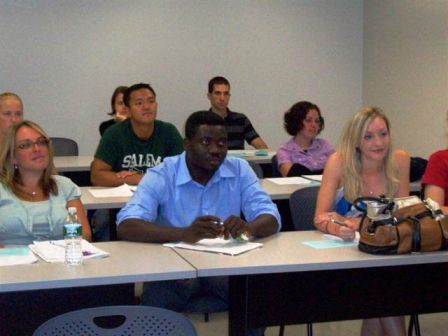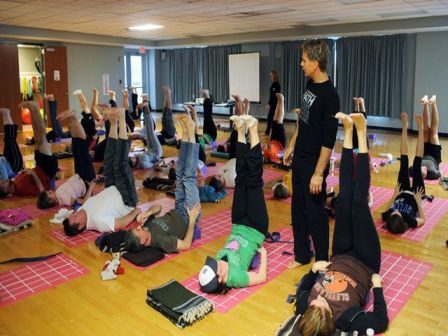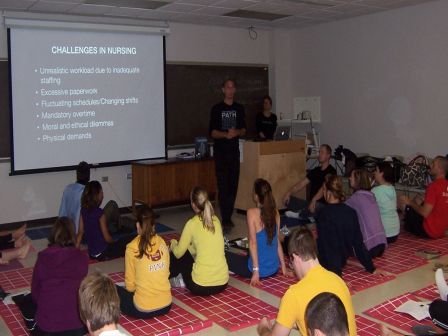Managing Stress Associated with Accelerated Learning: Self-Care Strategies Promote Academic Success

Nursing is a stressful occupation. Nursing students, and in particular accelerated nursing students, frequently experience a level of stress that many other bachelor’s or master’s degree students may not encounter. Several New Careers in Nursing (NCIN) grantees are responding to this challenge with self-care initiatives that target their accelerated nursing students.
These initiatives involve a variety of self-care and stress-reducing techniques and practices, from yoga to breathing exercises to self-guided meditation to time management and nutrition. “Everyone has to figure out what works for them, so providing a variety of techniques is extremely helpful,” said Robbie Sambat, an accelerated BSN student and NCIN scholar at Southern Connecticut State University. Sambat has found playing the guitar a great stress-reliever (he’s also a professional musician). He and his fellow accelerated BSN students also use Facebook to check in with each other and keep each other up-to-date on assignments and tasks for class.

Sambat is 42 and is similar to many other accelerated bachelor’s degree nursing students in that he has financial and family obligations to manage on top of school work. Accelerated degree students tend to be older than traditional students and also often struggle with returning to school and the classroom and entering a completely new field.
“We use a different language in nursing and some accelerated students may have the sensation that they’re always behind,” said Julie Liefeld, RN, LMFT, PhD, director of counseling services at Southern Connecticut State University. “We also hear from accelerated students that they’re very aware of the pressure and intensity of an accelerated program. They feel a sense of urgency – they need to meet the same benchmarks as four-year nursing students and they have only 12 months to get there.”

Southern Connecticut State University (SCSU) launched its self-care initiative for accelerated BSN students this semester. The program is a partnership with the SCSU’s Counseling Department and includes sessions every two weeks during which students have an opportunity to talk about any challenges they’re facing and learn a range of self-care techniques, such as deep breathing, self-reflection, yoga, and guided imagery. The initiative will also include a “Destress Festival and Lounge” during the high stress periods during midterms and final exams.
“This initiative is all about enhancing our students’ success,” said Mary Ann Glendon, PhD, MSN, RN, program coordinator for the ACE and RN to BSN Programs at SCSU. “These students are high achievers. They’re used to doing well and have high expectations for themselves. That’s stressful enough, but on top of that many are returning to school and are suddenly dealing with being in the unfamiliar role of the novice, which can cause even more stress.”
“We’re conducting a formative evaluation of this initiative, so that we get student feedback every step of the way,” said Lisa Rebeschi, PhD(c), RN, MSN, CNE, associate professor and chairperson of the Nursing Department. “So far we’ve had one session and we’re already getting suggestions and questions that we’ve been able to address. We want this initiative to truly meet the needs of our students. To do that we need their input.”
At Kent State University, accelerated and traditional nursing students have been participating in a pilot “Care of the Caregiver” study, through a collaboration between Kent State and the Urban Zen Foundation, started by fashion designer Donna Karan. This program includes training in yoga, aromatherapy, Reiki, nutrition and contemplative care.

Karan’s focus on helping nurses learn self-care techniques began when her husband, a sculptor and painter, Stephan Weiss, was dying of lung cancer. Among his last words to her were “take care of the nurses.” Now Karan is helping nursing students take care of themselves.
“This program is incredibly important for nursing students and for the nurses they will become and the patients they will care for,” said Tracey Motter, MSN, RN, senior undergraduate program director at the College of Nursing. Motter reports that the two cohorts of Kent State nursing students who participated in the intervention seemed to benefit from the practices they learned. The research data also shows that when accelerated students use the practices learned through Urban Zen, they report less perceived stress on the Perceived Stress Scale (Cohen, Kamarck, & Mermelstein, 1983) and increased mindfulness on the Mindful Attention Awareness Scale ( Brown & Ryan, 2003). The one sticking point was that some students felt the Reiki had religious overtones that they weren’t comfortable with.
Kent State is also developing an application (app) that can be used on mobile devices (such as iPhones or Androids) that will help individuals through guided imagery, mindfulness and breath awareness exercises. With such heavy course loads and demanding schedules, Kent State wants students to have self-care tools available to them at a moment’s notice, and these mobile apps will do just the trick. Apps will be made available only to Kent State students, but similar programs are available for free on another NCIN grantee’s website, University of California at Los Angeles (UCLA).

Realizing that both practicing nurses and students greatly benefit from these simple tools and techniques is what drives schools such as Kent State and SCSU to promote self-care strategies. “When nurses understand and master self-care techniques, not only are they capable of practicing mindfulness and staying focused when they’re caring for patients, they’re also able to teach those techniques to their patients, said Motter. “This goes for nursing students in clinical rotations as well as RNs who are in practice. Too often we instruct our students to engage in self-care, but we don’t provide the tools for them to be successful.”